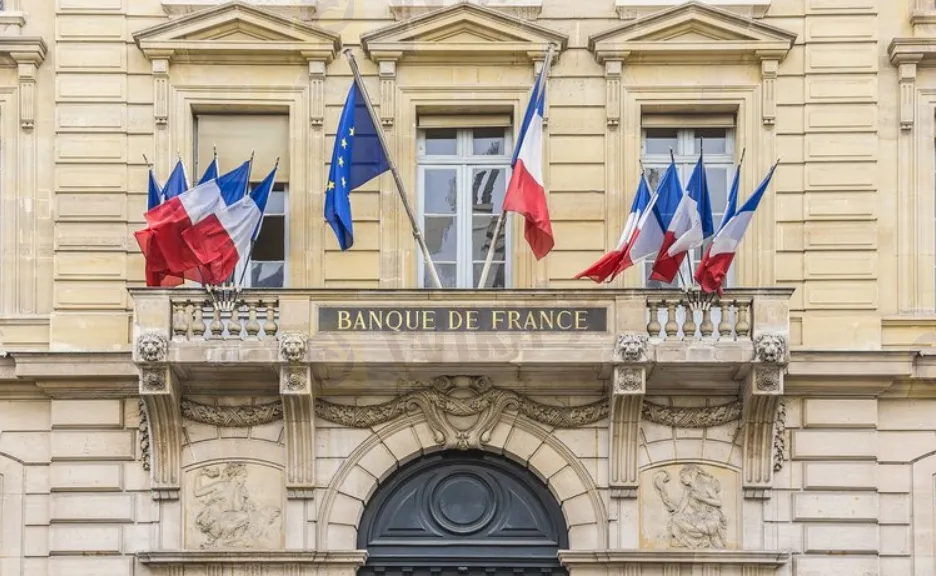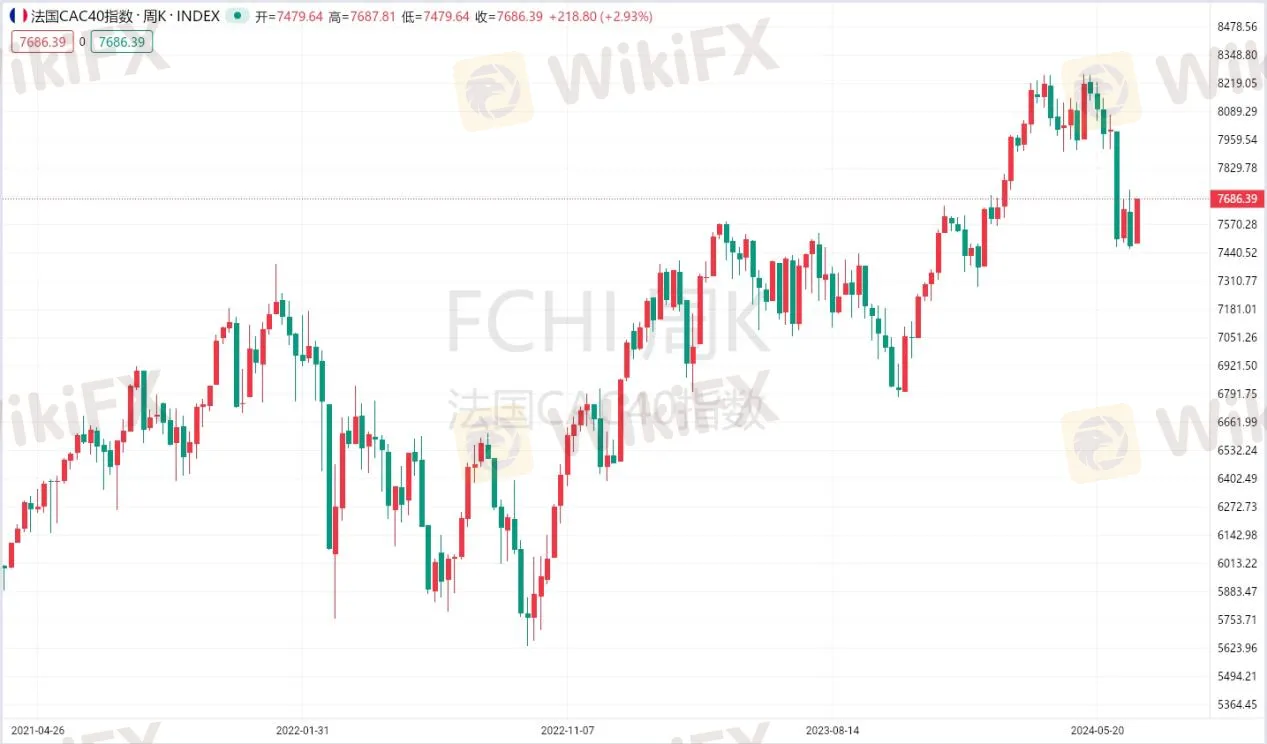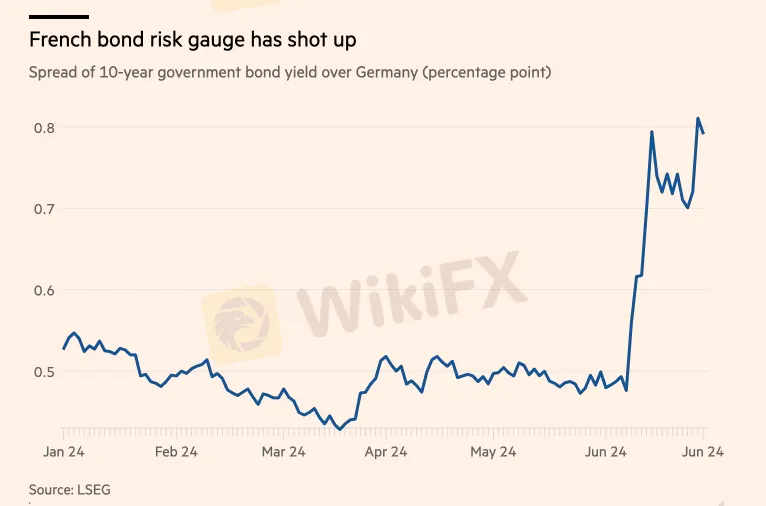简体中文
繁體中文
English
Pусский
日本語
ภาษาไทย
Tiếng Việt
Bahasa Indonesia
Español
हिन्दी
Filippiiniläinen
Français
Deutsch
Português
Türkçe
한국어
العربية
【MACRO Alert】The shifting political landscape in France has triggered market fluctuations, prompting the European Central Bank to consider initiating TPI to prevent the crisis from spreading!
Zusammenfassung:As the first round of voting in the French National Assembly elections concludes, global investors are once again focusing on this major Western European nation. According to CCTV News, the far-right political party National Rally leads with 33% of the vote in the initial round, followed closely by the left-wing coalition "New People's Front," which garnered 28.5% of the ballots. The ruling party, Renaissance, and the centrist alliance "Together" ranked third with 22% of the votes. This outcome
As the first round of voting in the French National Assembly elections concludes, global investors are once again focusing on this major Western European nation. According to CCTV News, the far-right political party National Rally leads with 33% of the vote in the initial round, followed closely by the left-wing coalition “New People's Front,” which garnered 28.5% of the ballots. The ruling party, Renaissance, and the centrist alliance “Together” ranked third with 22% of the votes. This outcome not only suggests significant potential changes in France's political landscape but also brings uncertainty to the markets.

The French National Assembly elections are held every five years. This election was advanced due to President Macron's setback in the European Parliament elections. The initial results show the far-right National Rally leading in the first round of voting, potentially offering Marine Le Pen's party a chance to pursue its anti-immigration and euro-skeptic agenda. However, uncertainty remains whether the National Rally can secure an absolute majority in the second round of voting.
The uncertainty in the election results has already impacted the markets. The French CAC40 index has dropped by 6.42% over the past month, and the risk premium of French government bonds compared to German bonds has reached its highest level since 2012. Despite this, the euro opened slightly higher in early Asian trading, indicating some easing of short-term market volatility. Investors are concerned about changes in France's political landscape. Citigroup analysts suggest that whether the far-right National Rally or the left-wing “New People's Front” wins, it could force President Macron to resign and potentially lead to a market decline of up to 20%.
In addition, Zhao Yaoting, global market strategist for Asia-Pacific at Schroders, notes that France's heavy debt burden, with government debt around 110% of GDP, complicates prospects for fiscal consolidation. Market concerns about the uncertainty of the election results persist, but victory by centrist alliances or “constrained” right-wing parties is seen as most favorable for the markets. This outcome could limit a sharp increase in the fiscal deficit and potentially boost the French stock market by 5%. However, if the parliament becomes deadlocked and fiscal risks persist, the MSCI France index price-to-earnings ratio could fall by up to 10%.The first round of voting in the French National Assembly elections has drawn widespread attention and concern from the markets. The second round of voting is scheduled for July 7th, when the final allocation of the National Assembly's 577 seats will be decided.

Regardless of the outcome, the elections pose sustained significant risks to both France and the broader European stock markets. Investors need to closely monitor the final election results and their potential implications for policies and markets. Against this backdrop, global investors are now turning their attention to the European Central Bank, which is holding its annual conference in Portugal this week. Speculation suggests the ECB might intervene if the French elections trigger market panic.
Recently, French government bonds have faced sell-offs, widening the yield spread with German bonds, reflecting investor concerns over political risks. A parliamentary majority for the far-right National Rally or the left-wing New People's Front could further destabilize the markets. ECB President Lagarde might face questions about how to handle potential financial crises. Despite causing market sell-offs with her statements early in the 2020 pandemic, she is likely to proceed cautiously this time, especially with election results still uncertain.
German Finance Minister Lindner has urged the ECB to maintain a wait-and-see approach, warning of economic and constitutional issues that could arise from intervention. Nonetheless, market observers are scrutinizing the ECB's bond-buying programs to predict its potential actions. Italian central bank governor Panetta has stressed that the ECB should be prepared to deal with heightened political uncertainty and utilize all its tools. The “Transmission Protection Instruments” (TPI) introduced two years ago could face their first test amid turbulence from the French elections.

In other words, although France could be deemed ineligible for the use of the TPI due to potential violations of EU fiscal rules, European Central Bank officials believe they have the flexibility to address disorderly market dynamics. Chief Economist Lane has implied that market discipline and orderly market dynamics are key considerations. If the market turmoil triggered by the French elections is confined to France, the ECB may not immediately intervene.
However, if the turmoil spreads to other eurozone countries, particularly high-debt countries like Italy, the ECB might activate the TPI to prevent contagion. Market participants are closely watching the final outcome of the French elections and their impact on European financial markets.
Haftungsausschluss:
Die Ansichten in diesem Artikel stellen nur die persönlichen Ansichten des Autors dar und stellen keine Anlageberatung der Plattform dar. Diese Plattform übernimmt keine Garantie für die Richtigkeit, Vollständigkeit und Aktualität der Artikelinformationen und haftet auch nicht für Verluste, die durch die Nutzung oder das Vertrauen der Artikelinformationen verursacht werden.
WikiFX-Broker
Aktuelle Nachrichten
Solaris: Weiteres Millionen-Funding noch dieses Jahr – auch Verkauf steht im Raum
Volocopter: Laut Bericht steht das Flugtaxi-Startup kurz vor einer Übernahme aus China
KI-Blase, Milliarden-schwere US-Konkurrenz – warum DeepLs Jarek Kutylowski trotzdem keine Angst hat
Ich war auf der billigsten und der teuersten Kreuzfahrt derselben Reederei – das waren die größten Unterschiede
Ethereum: Deflationstrend und ETF-Euphorie könnten Rallye entfachen
Nur 100 Euro im Monat: So habe ich 4000 Euro Gewinn in 5 Jahren mit einem ETF-Depot für meine Kinder gemacht
85 Prozent Plus in einer Woche: Die 5 größten Altcoin-Gewinner im Bitcoin-Boom
Ripple XRP: Die Rally nimmt Fahrt auf – warum der Kurs jetzt explodiert
Ethereum: Rekordzuflüsse bei ETFs und Risiken durch unstaked ETH – Wohin geht der Kurs?
Statt in den Ruhestand zu gehen, kauften meine Frau und ich eine Pension: Es half uns, einen neuen Lebenssinn zu finden
Wechselkursberechnung


